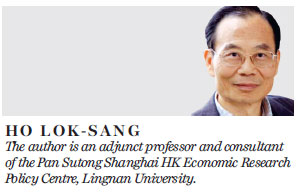Myths about social mobility exposed
Updated: 2016-07-05 07:40
By Ho Lok-Sang(HK Edition)
|
|||||||
Ho Lok-sang writes that a new study disputes the commonly held view that earnings mobility for young people in the SAR has dropped in recent years
The government recently released the results of the 2015 Study on Earnings Mobility. Surprisingly, the results appear to counter the general impression that upward earnings mobility in Hong Kong has fallen, so that recently young people have been facing much grimmer prospects of career advancement than earlier cohorts. The study, the fourth in a series of similar ones in recent years, was carried out by the Economic Analysis and Business Facilitation Unit of the Financial Secretary's Office. It was done in collaboration with the Census and Statistics Department, using data from the Inland Revenue Department and the Student Finance Office of the Working Family and Student Financial Assistance Agency.
The study analyzed the earnings mobility of post-secondary graduates from grassroots families in Hong Kong. The target groups comprised post-secondary graduates from the 2001-02, 2006-07 and 2011-12 academic years who had received means-tested student finance. The key findings are: "Substantial upward earnings mobility was enjoyed by first degree graduates from the 2001-02 and 2006-07 cohorts. Specifically, for the 2001-02 cohort, the median graduate could rise by eight income categories within 10 years," a government statement said. Even more surprisingly, "Sub-degree graduates or below for the 2001-02 cohort also enjoyed substantial upward earnings mobility: The median publicly funded graduate could rise by eight income categories within 10 years, while the median self-financing graduate could rise by 10 categories." The study found a small decline in fortunes for the 2006-07 (graduation year) cohort, compared to the 2001-02 cohort. But the decline is relatively minor and can be reversed over a longer time period.

These results must be a big surprise for most people, who have heard all along that advancement opportunities for the younger generation are fewer than earlier cohorts enjoyed. Is that impression all wrong?
I and my co-authors have produced a study using census data which tries to trace the fortunes of different cohorts through the years. We actually did find some evidence that upward mobility was rather lackluster for those born in 1976-80, but those born in 1981-85 are doing fine, especially for those who are well educated or who have skills. Indeed their "immobility ratio" at the low end is the lowest among all cohorts being studied and their "mobility ratio" at the high end is the highest ever. The immobility ratio is a measure of how likely those who were "poor" (the lowest quarter) in the earlier period remain poor in the latter period. Those born in 1981-85 have a five-year immobility ratio of 0.33. This means that there was a 33 percent chance of someone who was poor five years before remaining poor after five years. The immobility ratios of the earlier cohorts had ranged from 0.632 to 0.991. At the upper end of the income distribution (the upper quarter), we find that the "mobility ratio", at 4.096, is the biggest ever for the cohort born in 1981-85. The five-year mobility ratio is a measure of how many times a member of the cohort randomly picked is as likely to belong to the upper quarter of the income distribution at the end of five years as someone randomly picked from the same cohort at the beginning of the five-year period. For previous cohorts, the five-year mobility ratio ranges from 1.938 to 3.340.
Those born in 1981-85 would be aged 21 to 25 in 2006 and aged 26-30 in 2011. Assuming that the normal university graduation age is 22, they should be graduates in 2003-07. This is more or less the same age group as surveyed by the government study. Thus, the "post-80s" cohorts actually fare pretty well compared to previous cohorts. This is particularly surprising since the earlier cohort did suffer from a decline in opportunities, at least in the first five to 10 years of their careers.
One may well ask why upward mobility improved, and why there are nevertheless many examples of stagnant incomes. We can answer these questions with a reference to a growing aging population and to the rise of the knowledge economy. An aging population together with the fact that many senior positions were occupied by post-war baby boomers who are now retiring en masse means that opportunities for promotion to fill their vacated positions have expanded rapidly. Once promotions take place, more promotions from below also will take place, as promoted staff will also vacate relatively senior positions. Thus those who have the ability to demonstrate that they are promotable actually do get promoted in large numbers. Unfortunately, within each cohort there are always people who are unskilled and a knowledge economy will not treat unskilled people very well. This is why there are indeed cases where people have had stagnant incomes over the years.
In a knowledge economy, skills still hold the key to career advancement. This includes hard and soft skills. Young people who want to take advantage of the emerging opportunities must prepare themselves well. It is a very competitive world out there.
(HK Edition 07/05/2016 page8)